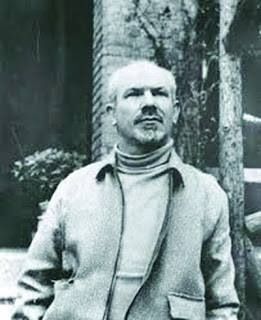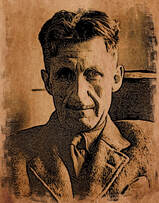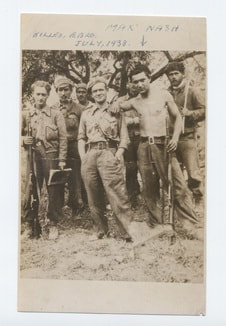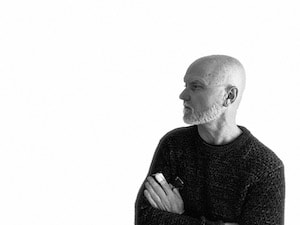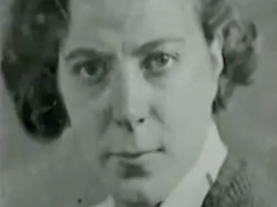 What prompted a working class girl from Scotland to come to Spain during the civil war? What compelled her to side with the anarchist movement and become the voice of that movement to the world? Part of the series: Anarchism in Spain featuring George Orwell, Durruti, the Catalan Car Industry etc - this week we look at Ethel McDonald (see links below). The Struggle For another LifeIt is astonishing how many accounts of the Spanish Civil War today, still portray that battle as a struggle between the forces of Fascism and the forces of Democracy. Yet for anyone who has delved into the origins of the 2nd Republic in Spain and the issues being fought out during the early 1930's there was another agenda, a parallel struggle as important as anything that was happening in the barracks or on the battlefield. This was the struggle for another way of life. Not merely the defence of the new "democratic Republic" that had still to tackle the hardships, inequalities and injustices of the masses. This was another struggle that defied the simple definitions of "left or right". This was a struggle to forge something new, something - as Noam Chomsky has argued - that would represent an entirely new way of living in this world. Anarchism in Spain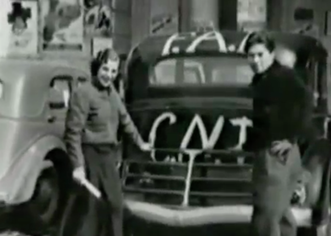 In this short series on Anarchism in Spain, I shall be exploring this radical and immensely popular movement through the eyes of a few individuals that were driven, not simply to defend the few hard-won rights in a fledging democracy, but to go further and begin the construction of a new society altogether. These individuals were not satisfied with the reformism of democracy, nor the authoritarianism of the Communist dreams, for they were individuals that articulated a new future that would shake the political forces across the globe and in so doing, provoke an uneasy alliance between left and right to undermine it, to capture and, as we now know, to kill its leaders. And in so doing, attempt to destroy its ideology, turning it into the sad parody it has become today. The Story of Ethel MacDonald: The Scottish Anarchist in Spain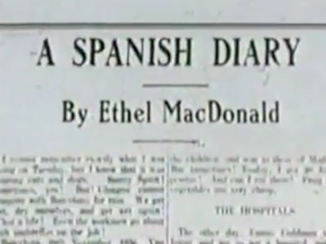 In 1936, with the civil war about to break out, one Scottish woman from Motherwell finds a job in a workers rights centre in Glasgow, helping distribute the radical newspaper: Regeneration. As the struggle in Spain intensifies, Andre Proudhon asks for an English speaker to come to Barcelona and report on the struggle. She is sent out to cover, what appears to be an imminent outbreak of war. Against a backdrop of Mussolini in Italy and a newly elected Hitler in Germany, she makes her gradual way to Catalunya and arrives in the city 2 months before Orwell will arrive. Like him, she sees not a country in preparation for war, but a people who have at last shaken off the shackles and constraints of the past. A people that were not content to simply defend a republic but instead intent on creating a completely new order that effortlessly takes control of industry, society, government, commerce, health and education. This is not the anarchism of the popular press, but one of self-educated organisations that spring up to run a city and a country by the very people themselves, without the hierarchies and divisions that had plagued other radical movements of those times. Ethel McDonald walked into a city that had decided to move things forward themselves. Women had been promised liberation under the Spanish Republic, but were still plagued by inequality, low wages and arranged marriages, but in Barcelona they had decided not to wait any longer for the promised reforms in Madrid. Here she found in the city a deeply rooted sense of liberation: In the modes of dress, in the dignity of work, in the emphasis on schooling and social organisation - all was changing before her eyes. Even in language there were changes: the word "mujer" being replaced by "compañera" "Peasants formed communes on land confiscated from the old ruling elite. Three million men, women and children lived and worked in them. Anarchists had taken over the factories. Police were replaced with civilian self-defence forces. Three quarters of the economy was under anarchist control. Hotels, shops, barber shops and restaurants were collectivised and managed by their workers – often increasing productivity and profit. The maxim ‘from each according to his ability, to each according to his need’ was put into practice. Women won the right to divorce and abortion, and the idea of ‘free love’ became popular in the sense [of] the right to enter into a relationship without the permission of State or Church." The Russian Agenda in the Spanish Civil War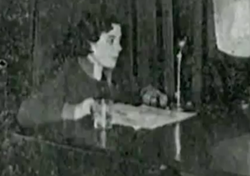 As her reports on the Catalan Revolution are sent home, Ethel MacDonald is offered a job on Barcelona Radio to send out reports to the rest of the world in English, and to speak directly to the International troops arriving to help the Spanish cause. She takes the job, but surprisingly for those who offer her the work, she does so from the perspective of an anarchist and her reports are inspiring and motivating to her "compañeros/as at the front. However, as she reports on the revolutions successes and failures, the civil war slowly shifts ground and the relatively small Communist Party becomes an influential power. The more Spain is dependant on Russian arms and assistance, the more the nature of the struggle changes. The Russian Agenda Stalin instructs the now prominent Communist party in Spain to halt the anarchist revolution at all costs. He does this two reasons: First, because Russia fears Britain and French resistance to such a radical movement and Stalin needs their support against Hitlers threats to the USSR. Secondly, Stalin fears the ideological influence of Anarchism - with its immense influence and popularity and its close association with Trotskiest groups such as the POUM (in which Orwell is fighting). The anarchist movement represents an alternative and immediate path to social revolution, one that seems not to require the authoritarianism of Russia's own state party. The Bolsheviks had already dealt with anarchists during their own revolution, and knew what to do to stop their influence in this one. As Orwell describes in Homage to Catalonia, the Communists grew in influence each day and quickly became the persuasive force behind the Spanish Government's decisions. Arrested and ImprisonedIt does not take the Communists long before they begin to "clean-up" the anarchist revolution in Catalonia. After the death of Durruti and the Barcelona funeral procession, the Communists push forward with pressure to dismantle the anarchist movement entirely. The May 1937 attack on the Barcelona telephone exchange , and the subsequent 4 days of fighting end the independence and struggle of the anarchists. Ethel MacDonald is placed under arrest and is imprisoned by the very people she came to help. When she is finally released, she leaves Spain via a British ship ported at Barcelona. But once outside Spain, the anarchist journalist continues to travel and speak publicly to raise funds and awareness for the Spanish revolution - a revolution so recently betrayed. 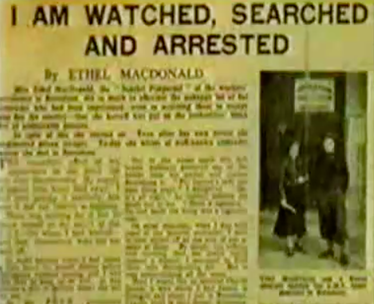 Sadly, in 1958, she was diagnosed with MS and loses the ability to speak. Ethel MacDonald dies in 1960. You can watch the biographical series on her extraordinary life on Youtube. Here is a link to episode 1. For more on Civil War Spanish History see: Norman Bethune the Canadian ambulance driver 1984, Orwell and the Spanish Civil War Sol Frankel: An interview with a British Volunteer READ THE OTHER SPANISH CIVIL WAR STORIESThe Ethel MacDonald TV: Part 1
Nick Gilbert
9/6/2016 11:57:23 am
Just discovered your website while Googling Orson Welles + Spain. Will be looking at it in a LOT more detail. Really interesting. I've just spent 10 months in Extremadura in my partner's village but we're going back to UK at our daughter's behest. Hard to tell which is worse politically. Anyway, great website/blog. Keep up the good work. If you want info/tips on this part of Spain I might be able to help. Comments are closed.
|
StoreBooks
Videos Audio |
PDFs to Download |
|
